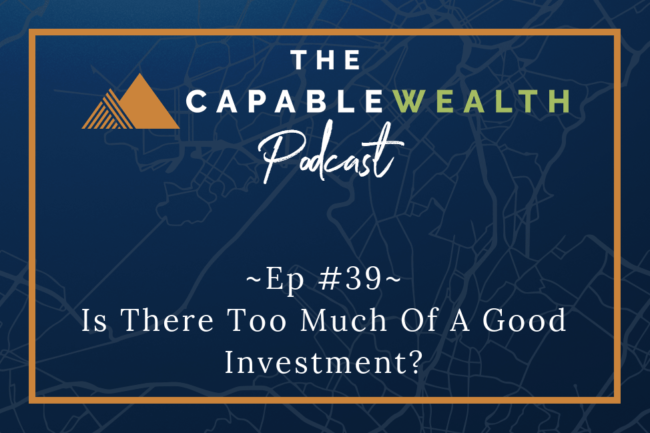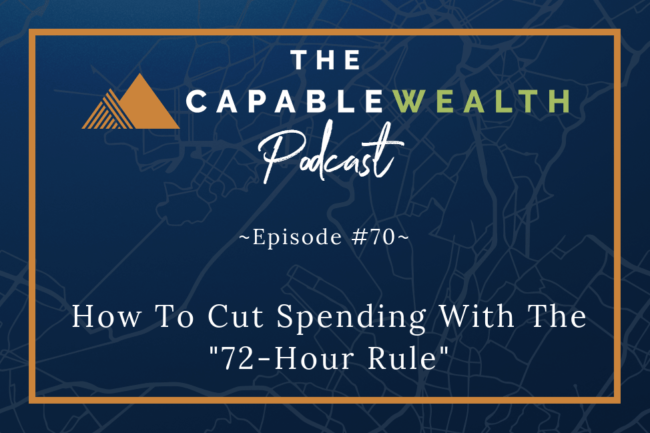Building wealth isn’t just about knowing the right steps to take and then taking them – it truly is a lifestyle and mentality.
You certainly have to understand the mechanics of finance, but you also have to LIVE it. Just hoping your investment returns outpace your spending habits doesn’t usually equate to success.
EARLY STAGES OF GROWING WEALTH
I remember growing up in a household that was characterized by welfare and food stamps. We had a single mother who was raising four kids on her own. There wasn’t much extra money to go around.
In college, I remember living as frugally as possible. I would wait until the supermarket was running discounts on microwaveable dinners for $1 each, and I’d stock up. My roommates would laugh at me as I walked into the apartment with huge grocery bags full of them.
Mixed in with your typical college Ramen Noodles, it was truly a healthy diet… 😉
After I graduated and began working, there was a moment want I started to actually amass some savings. I can remember the day my bank account got over $3,000. I was feeling pretty good about myself.
I no longer had to buy $1 microwaveable dinners, and I wasn’t worried about how I would pay for things until my next paycheck came in. I was officially no longer living paycheck-to-paycheck.
Flash-forward to today – If my bank account balance goes under $25,000 I begin to get a bit uneasy.
My, how things have changed!
This change has made me think a lot about how I think about money, and how everyone goes through a natural evolution in their mindset.
THE PROGRESSION OF YOUR MONEY MINDSET
There is a natural progression in the way people handle and think about money. When you’re really young, money isn’t even a thing. Before kids learn about money, they have no idea how work equates to earning an income, and we use that income to live out our lifestyles, and hopefully build wealth.
I’ve written articles about how parents can help their kids become financially fit.
[12 Ways To Raise Financially Fit Kids]
No matter where you are in your evolution of money thinking, just know that you can continue to improve and progress.
You’ll change your opinion on things like:
- How much cash savings you should have at any given time
- What percentage of your paycheck you should regularly be saving
- What types of investments are you willing to get involved in (more or less risky)
- How many streams of income you should be generating
BREAKING BAD MONEY HABITS
Unfortunately, just like parents can teach their kids good financial habits, they can also teach them bad habits.
Your parents might have been really bad at handling money, and you may have unfortunately formed habits similar to their own.
Don’t worry, it’s not too late. The important thing to know is that you can work to change your habits.
The sooner you get started and make changes, the sooner you’ll reap the rewards.
I remember hearing a story about how Warren Buffett first started learning about earning money and investing. He was 7 years-old, and he read a book called “1,000 Ways To Make $1,000.”
If you don’t know who Warren Buffett is, he’s credit as being one of the greatest investors ever.
Part of his success is that he started on his wealth path at such an early age.
It helps to start early. But, as the Chinese proverb goes:
“The best time to plant a tree was 20 years ago. The second best time is now.”
So, if you don’t feel like you’ve perfected this money thing, get started!
HOW TO IMPROVE YOUR MONEY MINDSET
The best way to learn anything is by actually doing it. And the best people to learn from are those who have had success in that specific area of interest.
So, it would make sense that we should try and learn about building wealth from those who have amassed great fortunes in their time, and emulate the things they are doing.
No, I’m not talking about the lifestyles of the rich and the famous who blow their money on luxury goods. I’m talking about those who have built true wealth overtime.
[Why Do Rich People Buy The Worst Assets?]
And the fact that 80% of millionaires are first-generation, meaning they didn’t inherit their money, means that you have a strong chance of reaching that goal if you put in the effort!
When I first began to truly dig into learning about personal finance I read every book I could get my hand on. I wanted to stuff my head full of as much knowledge as possible!
Some books I’ve read:
- The Millionaire Next Door
- Rich Dad Poor Dad
- The Richest Man In Babylon
- The Millionaire Real Estate Investor
And many more…
Reading books won’t make you a millionaire, but they will equip you with a basic understanding of the wealth-building game, and they will provide you with a guide map of how to get to your goal. The next part is actually EXECUTING!
TAKE MASSIVE ACTION WITH GRANT CARDONE
One big name in the world of entrepreneurship and wealth-building is Grant Cardone.
He’s written multiple best-selling books, grown several multi-million dollar businesses, and his real estate firm, Cardone Capital currently is approaching $1 Billion in real estate holdings.
If you read his books his message becomes quite clear – You must become obsessed with whatever you are trying to accomplish, and you must take massive action in order to achieve it.
If you’re interested in digging in, check out his books “The 10X Rule” and “Be Obsessed Or Be Average.”
TAKE TIPS FROM MR. MONEY MUSTACHE
On the flip side of that, you can choose to go a simpler route and learn from the wise sage himself, Mr. Money Mustache.
The message you’ll hear on his website is one of frugality and simple living. He’s discussed the value of being able to live on less than $25,000/year, even though he makes much more than that now with his website.
The value of this is in relation to decreasing stress in your life that stems from money. If you don’t need a lot of money to live off of, then you don’t need worry about growing massive amounts of wealth.
WHAT CONCERNS ME ABOUT FOCUSING ON MONEY
One thing that worries me is the idea that focusing too much on wealth-building could end up causing additional stress.
Is it better to be blissfully ignorant?
In reality, I would disagree with that. But the fact that I now get a bit uneasy with less than $25,000 in my bank account is interesting, especially considering that in the past I was thrilled to have $3,000.
If you ask around the finance industry, the recommended amount of savings you should have should equal 6-months of your income. I don’t necessarily agree with that, completely, but it’s a good starting point.
Warren Buffett has said that he views cash as an option on a great investment that just hasn’t presented itself yet. That’s partly why I like to have even more than that $25,000 lying around. If an opportunity arises and I don’t have much money available, I’ll miss out.
I guess I can’t be too upset, especially when I read things like: “63% Of American’s Don’t Have Enough Savings To Cover A $500 Emergency.”
SHOULD YOU JUST BE HAPPY WITH WHAT YOU HAVE?
I’ve read a good amount of Stoic philosophy. One of the guiding principles is that you should not yearn for what you do not have.
“It is quite impossible to unite happiness with a yearning for what we don’t have. Happiness has all that it wants, and resembling the well-fed, there shouldn’t be hunger or thirst.” -Epictetus
So, is striving to build wealth a losing endeavor? Are you just chasing something that you could have if you could just be content with your current situation?
This is a deeper question you need to ask yourself.
Personally, I see financial freedom as more than just being wealthy. It is a true sign of control over your life.
Unless you can eliminate your need for money, you have to figure out a way to control it, or it will control you. Building toward financial freedom is one way to do that.
FINAL POINTS ON THE MINDSET OF WEALTH
The important thing to remember in all of this is that building wealth is about more than just taking specific actions; it’s a mindset and a lifestyle. As you progress through your financial education and wealth-building journey, your mindset will evolve. Embrace those changes, but be sure to constantly evaluate them and make sure that they align with what your goals are.
The actions you’ll need to take in order to become a millionaire are quite different than those needed to become a billionaire. Either goal is good, but do they match up with what you want out of life?
As I’ve said many times, financial planning is not about growing your bank account, it’s about increasing the quality of your life. One way to do this is to build wealth. Just don’t get caught up in someone else’s dreams and lose sight of your own.
Capably Yours,
















